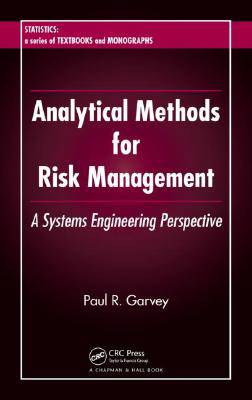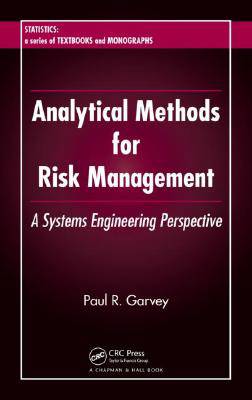
- Afhalen na 1 uur in een winkel met voorraad
- In januari gratis thuislevering in België
- Ruim aanbod met 7 miljoen producten
- Afhalen na 1 uur in een winkel met voorraad
- In januari gratis thuislevering in België
- Ruim aanbod met 7 miljoen producten
Omschrijving
A Text on the Foundation Processes, Analytical Principles, and Implementation Practices of Engineering Risk Management
Drawing from the author's many years of hands-on experience in the field, Analytical Methods for Risk Management: A Systems Engineering Perspectivepresents the foundation processes and analytical practices for identifying, analyzing, measuring, and managing risk in traditional systems, systems-of-systems, and enterprise systems.
Balances Risk and Decision Theory with Case Studies and Exercises
After an introduction to engineering risk management, the book covers the fundamental axioms and properties of probability as well as key aspects of decision analysis, such as preference theory and risk/utility functions. It concludes with a series of essays on major analytical topics, including how to identify, write, and represent risks; prioritize risks in terms of their potential impacts on a systems project; and monitor progress when mitigating a risk's potential adverse effects. The author also examines technical performance measures and how they can combine into an index to track an engineering system's overall performance risk. In addition, he discusses risk management in the context of engineering complex, large-scale enterprise systems.
Applies Various Methods to Risk Engineering and Analysis Problems
This practical guide enables an understanding of which processes and analytical techniques are valid and how they are best applied to specific systems engineering environments. After reading this book, you will be on your way to managing risk on both traditional and advanced engineering systems.
Specificaties
Betrokkenen
- Auteur(s):
- Uitgeverij:
Inhoud
- Aantal bladzijden:
- 282
- Taal:
- Engels
- Reeks:
Eigenschappen
- Productcode (EAN):
- 9781584886372
- Verschijningsdatum:
- 20/10/2008
- Uitvoering:
- Hardcover
- Formaat:
- Genaaid
- Afmetingen:
- 157 mm x 236 mm
- Gewicht:
- 521 g

Alleen bij Standaard Boekhandel
Beoordelingen
We publiceren alleen reviews die voldoen aan de voorwaarden voor reviews. Bekijk onze voorwaarden voor reviews.









